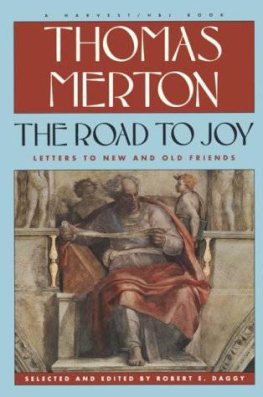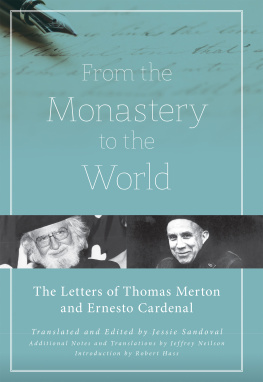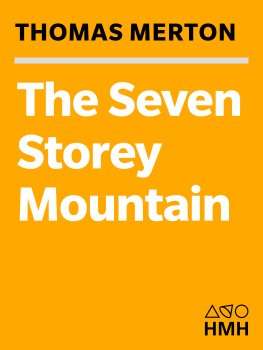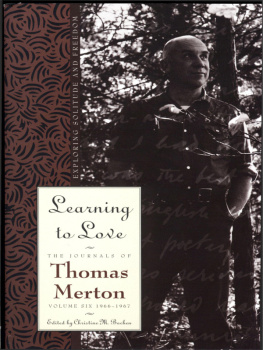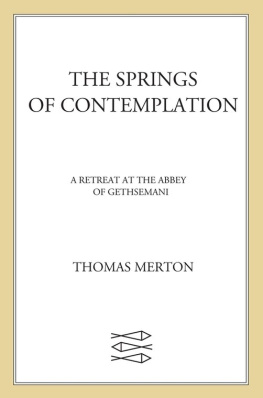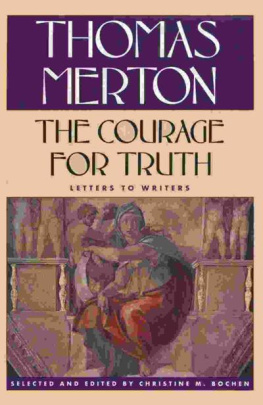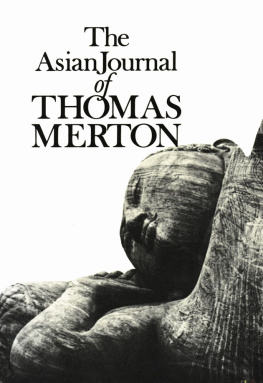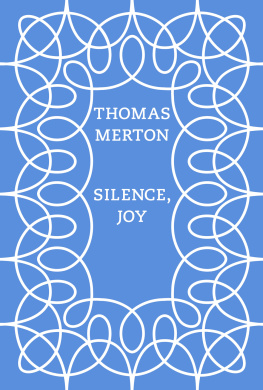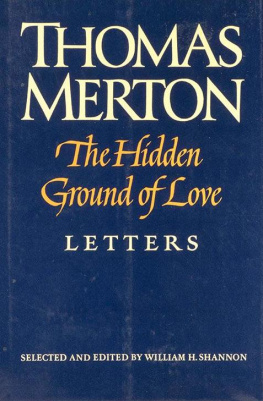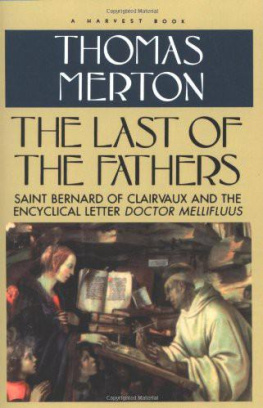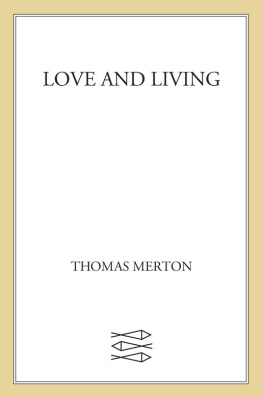Thomas Merton - Road To Joy: The Letters Of Thomas Merton To New And Old Friends
Here you can read online Thomas Merton - Road To Joy: The Letters Of Thomas Merton To New And Old Friends full text of the book (entire story) in english for free. Download pdf and epub, get meaning, cover and reviews about this ebook. year: 1993, publisher: Mariner Books, genre: Art. Description of the work, (preface) as well as reviews are available. Best literature library LitArk.com created for fans of good reading and offers a wide selection of genres:
Romance novel
Science fiction
Adventure
Detective
Science
History
Home and family
Prose
Art
Politics
Computer
Non-fiction
Religion
Business
Children
Humor
Choose a favorite category and find really read worthwhile books. Enjoy immersion in the world of imagination, feel the emotions of the characters or learn something new for yourself, make an fascinating discovery.
- Book:Road To Joy: The Letters Of Thomas Merton To New And Old Friends
- Author:
- Publisher:Mariner Books
- Genre:
- Year:1993
- Rating:5 / 5
- Favourites:Add to favourites
- Your mark:
- 100
- 1
- 2
- 3
- 4
- 5
Road To Joy: The Letters Of Thomas Merton To New And Old Friends: summary, description and annotation
We offer to read an annotation, description, summary or preface (depends on what the author of the book "Road To Joy: The Letters Of Thomas Merton To New And Old Friends" wrote himself). If you haven't found the necessary information about the book — write in the comments, we will try to find it.
Road To Joy: The Letters Of Thomas Merton To New And Old Friends — read online for free the complete book (whole text) full work
Below is the text of the book, divided by pages. System saving the place of the last page read, allows you to conveniently read the book "Road To Joy: The Letters Of Thomas Merton To New And Old Friends" online for free, without having to search again every time where you left off. Put a bookmark, and you can go to the page where you finished reading at any time.
Font size:
Interval:
Bookmark:

Table of Contents
As the general editor of the Letters of Thomas Merton, I have had the unique privilege of reading all the letters stored in the archives of the Thomas Merton Center at Bellarmine College in Louisville, Kentucky. The more I have read the lettersand my total reading time in going through them would probably amount to several months at eight hours a daythe more I have felt they should be made available to as wide a reading public as possible.
Like his books and essays, Mertons letters articulated his desire, growing through the years, to be in touch with contemporary men and women as they struggled with questions of truth and meaning and the responsibilities that continually trouble the human spirit. There is a particularity about a letter that it is not possible to achieve in a book: letters are one-on-one; they exist for dialogue and call for reaction. Yet if they are goodand Merton was a good letter writertheir particularity spills over into issues that touch our common human situation. When they are deeply personal, one can put oneself in the place of the correspondent and experience the letter as if directly addressed. Because the letters often touch on perennial human questions, one can also share in their insights.
Though Mertons letters do come to grips with substantive issues, they are not ponderous or prosaic. The impish smile that lights up so many of his photographs seems to look out through the letters, tooperhaps in a special way in this volume, which bears the title The Road to Joy. The ready wit and the bright phrase that characterize his writing are present here in abundance.
Thomas Mertons letters, like most good letters, are not polished essays on the topics they deal with. More often there are flashes of intuition on a subject that is left open-ended. This sense of incompletenessmildly frustrating at times, one might want to sayprods both writer and reader to follow paths that have been opened but not yet fully explored. The Road to Joy points to many such paths. The readers of this volume are fortunate to have Dr. Robert Daggy, director of the Thomas Merton Center, as guide along the way.
WILLIAM H. SHANNON
General Editor
If a man does not make new acquaintances as he advances through life, he will soon find himself alone. A man should keep his friendships in constant repair. DR. SAMUEL JOHNSONQUOTED BY JAMES BOSWELL One enjoys contacts more when the letters are from ones real friends, and not just a pile of ill-assorted business and other nonsense from complete strangers. THOMAS MERTON
TO SISTER THERESE LENTFOEHR I hope you and I together will secretly travel our own road to joy, which is mysteriously revealed to us. THOMAS MERTON TO GRACE SISSON
The second volume of Merton letters contains correspondence with relatives and special friends. It follows the first volume, The Hidden Ground of Love, which was devoted to letters on religious experience and social concerns. Other projected volumes will present Mertons letters on religious life and renewal, edited by Brother Patrick Hart; those on writing, edited by David D. Cooper; and a concluding collection, edited by William H. Shannon. It is obvious that these categories are loose and many of Mertons letters may fall into more than one category. Certainly Merton discussed his family in letters not included here, and just as certainly he considered most of his correspondents to be his special friends. Relatives are of course a defined category, though in this case the meaning has been widened to include people who can be described, for one reason or another, as family friends. The term special friends presented some problems. Merton not only had a knack for making people feel special, but he built up his later friendships through correspondencea necessary means, since he had so little direct contact with people outside the monastery. Yet it is true that we all have some special friends in our lifetime, people to whom we feel particularly close, people who stand outside the normal routines of our lives and our occupations, people with whom we have shared a point in time and space and with whom our rapport lingers on. Thomas Merton was no exception. He enjoyed such special friendships, connected only tangentially (if at all) to his business of writing and his vocation as a monk, friendships which gave continuity to his journey.
The volume begins with his letters to one of those special friends, Mark Van Doren. Teacher and mentor, colleague and chum, fellow writer and fellow traveler, Van Doren occupied a unique place in Mertons life and in his affections. They had a continuous relationship, which extended from Mertons student days at Columbia College until his death in 1968. The final connection between these longtime friends is an ironic and suggestive one: Van Doren died on December 10, 1972, four years to the day after his friend Merton. It is neither the largest nor the longest set of letters in the volume, but it is a steady one, with a letter from Merton nearly every year. Van Doren carefully kept his letters from Merton (now deposited in Butler Library at Columbia), including the handwritten ones and the ones which Merton failed to carbon. This care has left us one of the most complete sets of Merton letters we possess and one in which we can trace Mertons consistent, even deepening, fondness and respect for Van Doren.
The second section contains Mertons surviving (perhaps it is better to say discovered) letters to and about his family, beginning with a letter written to his fathers art teacher, Percyval Tudor-Hart, on the day of his fathers funeral in 1931. It is the earliest Merton letter which we have. Undoubtedly, as a child, he wrote notes to his New Zealand grandparents and to his American grandparents, but all inquiries and searches have revealed no surviving letters to family members other than those included here. One tantalizing possibility emerged in a letter written in 1971 by Mertons Aunt Ka, Beatrice Katharine Merton, to the late John Howard Griffin. She told Griffin that the family members in New Zealand had turned over all their Thomas Merton materials to the Canterbury Public Library in Christchurch, but added that theirs was a family that did not keep letters, so she was unsure whether or not any letters were among those materials. Investigation showed that her instinct was correct: the materials given to the library in Christchurch consist of signed copies of Mertons books, a few photographs, and some memorabiliabut no letters. Merton himself admitted that he wrote very little to surviving members of his family after entering the monastery in 1941. Carbons of those written in the 1960s are preserved in the Thomas Merton Studies Center.
From the 1940s on, Merton complained that he received too much mail, that he had too many letters to answer, that he did not have enough time to answer them adequately, that correspondence at times was oppressive to him. Despite this, he carried on a volume of correspondence which is staggering. He frequently wrote letters the style and polish of which are astonishing. Yet there is no doubt that he felt the pressure of an ever-increasing correspondence from all sorts of people with all sorts of requests and questions. In the 1960s he began to solve this problem in part by composing form letters to be mimeographed and mailed to his new and old friends. These, he felt, would give his old friends news about him and his writing and would alleviate the need to write full-scale answers to new correspondents. The letter written and mimeographed in 1963 was largely intended for students who asked for information on Merton and on other topics. The Christmas 1965 letter marked the start of his growing reliance on this form as a means of answering a great deal of his mail. In the next three years he wrote more and more of these circular lettersthree in 1966, six in 1967, and seven in 1968. These letters have been gathered together and are published for the first time as a series in this volume.
Next pageFont size:
Interval:
Bookmark:
Similar books «Road To Joy: The Letters Of Thomas Merton To New And Old Friends»
Look at similar books to Road To Joy: The Letters Of Thomas Merton To New And Old Friends. We have selected literature similar in name and meaning in the hope of providing readers with more options to find new, interesting, not yet read works.
Discussion, reviews of the book Road To Joy: The Letters Of Thomas Merton To New And Old Friends and just readers' own opinions. Leave your comments, write what you think about the work, its meaning or the main characters. Specify what exactly you liked and what you didn't like, and why you think so.

